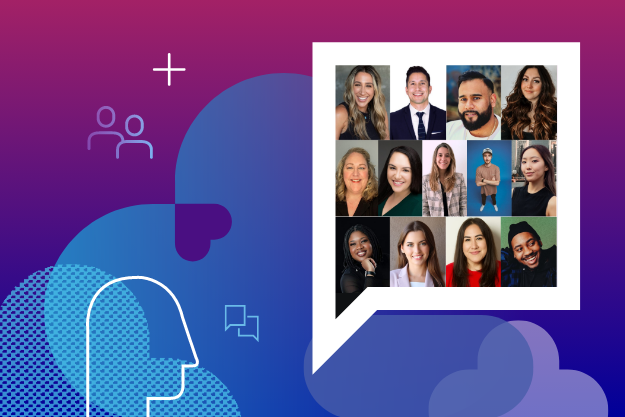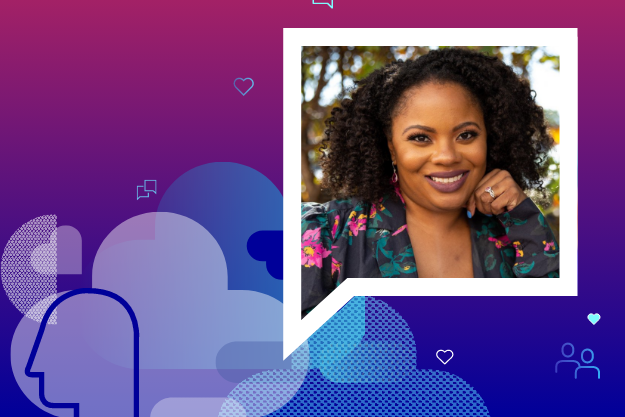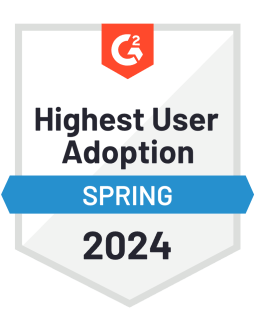As a social media manager, it’s your responsibility to keep your team informed about social trends and when it can be valuable to utilize them in your marketing efforts. While that may sound daunting, it’s actually an opportunity in disguise. The more connected you are with your broader company, the better you’re able to advocate for the resources you need to succeed.
Social strategist, thought leader, and former Director of Social Media at Peloton Kate Winick boasts years of experience in the world of social, as well as a unique background in media as a whole. Emplifi chatted with Kate to explore the best ways for social media marketers to keep their teams in the know while conveying the value of social to leadership — even if you can’t put a dollar amount on the impact of your campaigns.
We’d love to get to know you! Tell me a bit about your background in marketing.
I started my career as a journalist; that was what I wanted to be when I grew up. I reached the point where I was senior editor at a magazine, and it started to feel like print wasn’t where the energy was anymore — digital was the next big thing in the industry. At the time, I felt like I’d never get a job in digital because I had years of experience in print, but I ended up getting a job at a video streaming startup. I like to think back on that and remember that you’re always capable of making career changes and shifts that align with the trends you’re seeing in the world.
After that, I took a job as the Social Media Manager for Elle Magazine in the Hearst digital newsroom. That was a great experience, taking a really established media brand and figuring out how to bring it to life on digital channels. That was the moment, around 2011, that the social media industry started to explode. The networks existed, but it was a much smaller world than it is now.
I moved over to Peloton in 2018, as I was ready to explore the brand side of social. That’s when I really started to identify as a marketer and think about social as a marketing function. Because of my editorial background, I'm always very committed to what's best for the story and our audience — not just what’s best for the business. I think having that sort of laser focus on the end user is what separates great social from marketing. In a lot of my writing and speaking, I have an intention to educate and help younger social media managers. I think having good managers and mentors can make a huge difference in someone’s career, especially when it comes to social.
Why do you think it’s important for social media managers to be plugged into campaigns and conversations happening in other departments?
You become more valuable and can advocate better for yourself in the event of layoffs or salary increases if you make it clear what your social media strategy adds to the organization, beyond your own metrics. A huge part of how I approach my work is to make sure that everybody and their boss know that what I do adds value. Social shouldn’t be siloed.
I always make sure my social team has a great data analyst who talks to the rest of the organization, so that social data is seen as a valuable source of insight for the business as a whole. I think there's also an old argument between organic and paid, but it’s important to work alongside each other. I make sure my team has visibility into what the paid team is seeing, and think about ways we can test content and optimize ideas together.
In social, you're the team that sees things first, and I always take any opportunity I can to make sure that I'm routing things from social to the right team, whether that’s PR or customer service. When there's a problem with your product, the people on X/Twitter are the first to see that. At Peloton, that meant we worked closely with the product and member experience teams so they could let customers know or update a status page.
I think social should always have an open line to everybody, and I see that as taking opportunities to be evangelical about both the quality of your own work and what your work is accomplishing.
How can busy social media managers actively educate their teams about social media marketing?
I'm a big fan of not reinventing the wheel. Rather than giving yourself a whole other task to do, look for existing reporting or structures that your team can plug into. If there's a monthly report that your customer success team puts together, see if you can shoot over insights for that. If your team is reporting results from a customer survey, see if you can tack on some info about social trends related to your brand.
There are a lot of social media managers who make a commitment like sending out a weekly trends email so that everybody sees it, and it’s not very long before they're feeling burned out, and wondering if anyone even reads it. Instead, I recommend something like an opt-in Slack channel, inviting people within my organization who are internet savvy and genuinely interested in social media trends. Some of your teammates who don’t necessarily work in marketing might end up having invaluable insights just by sharing the ways they use social media personally.
We generally drop trending ideas or concepts into that channel to pressure test them with an audience that's somewhere in between the general public and a social media team. It turned out to be a great way to facilitate dialogue within our broader team without having to add a whole new workflow.
It can be challenging to validate social strategies and spend based on top-of-the-funnel metrics like impressions. What are your best tips to prove the value of social initiatives to leadership?
Depending on the way a campaign is structured, you may very well be able to actually connect social strategies, like TikTok Shop, to revenue goals. And as platforms evolve, that’s becoming even more likely. In this industry, we’re always hearing about the argument of brand awareness versus conversion. Everyone’s in agreement that brand marketing does something, but it’s hard to measure, so it seems like you’re better off investing in conversion-based marketing. But the only brands that really matter right now to consumers are the ones investing in exactly the opposite. So, how do you reconcile that?
Make sure that your social team and leadership remember that, ultimately, you will empty out a funnel from the bottom if you don't refill it from the top. I think this is where tools like Emplifi come in handy to bake more social listening into your reporting process and connect your post-level KPIs to broader campaigns. At Peloton, we were able to show that following our social accounts meaningfully shortened the amount of time between brand discovery and making a purchase. Even if we didn’t put a revenue amount on it, we were able to say, “If a consumer spends three fewer months in the consideration phase, that’s a lot of spend we don’t have to use on retargeting ads.”
It's not just about the dollars you bring in. It's also about the efficiency you create, like the people who get their question answered in Instagram comments and don't have to call your contact center — that’s a call you didn’t pay for because they engaged with your content. When you explain it in that way to leadership, I think it’s a little easier for them to swallow the budget and resource asks you have for social.
That’s great advice. It’s hard to convey the value of social to leadership because they can't immediately see an impact on revenue, or otherwise.
I always say that the most important decisions you make in social and the results you drive are all completely invisible. That’s one of the hardest things about building a career in social media. If someone asks me what the most important social media post at our company was, I say it’s the ones we didn’t publish, the posts that may have resulted in an absolute PR firestorm and cost us weeks of bad media. I can't show it to you. I can't tell you how it performed. All I can do is tell you what would have happened if I hadn't stopped it, and you tell me how much that's worth to you.
What are your thoughts on leadership asking social media managers to “go viral”?
It's an interesting statement to break down. To literally “make” it is something no one can do; I can't take a built, done piece of content, and make it do anything — that's not how it works. That was either done in the early phase of a campaign, thinking about the ingredients that tend to make up viral posts, like celebrities, or it wasn’t.
At the same time, the definition of viral changes all the time, and there are posts with millions of likes that never even hit my “For You” page. TikTok has changed the game in terms of what it means to go viral. It used to mean that something was completely ubiquitous, and everybody was talking about it. Now, you can go viral in much smaller niches and completely light up one sector of the internet while lots of other people have no idea anything even happened.
Then there are posts that jump out of their niche and get even more people talking, and virality often now means making content with the intention of going way beyond your traditional audience. I'm sure that the social media manager at Solo Stove knew that when they asked Snoop Dogg to give up smoking for their campaign, it was going to be picked up by a million news outlets and reposted incessantly. That approach hit a cultural nerve that a lot of people could understand.
I’d push back on people who see “going viral” as a totally unreasonable ask from leadership. It’s more unreasonable if they're saying it about an existing piece of content that doesn't have the right components, or if they’re not giving you the time and money to do it right. But you should hope someone asks you to go viral, because it’s an opportunity to showcase what you’ve learned about the internet and social media industry and pitch the kind of work we all dream about getting to make.
If your leadership wants to create a viral campaign, I think it is on you to help contribute your unique knowledge of social media to help your team succeed. That doesn’t mean it always works, though. At Peloton, we found out that Chris Meloni from Law and Order SVU works out naked, which is why he works out at home. We ended up sharing a (censored) video of him working out completely nude, but the angle and the timing for the campaign wasn’t quite right, so it didn’t pick up steam the way it could have. You can’t guarantee something will go viral even if it’s great content, but your insights as a social media marketer are still valuable and valid.
Any last thoughts?
It's really cool to see so many people interested in social media marketing. I'm almost at the point of not having to explain to people what I do for work!
Connect with Kate on LinkedIn and check out her website here.









































